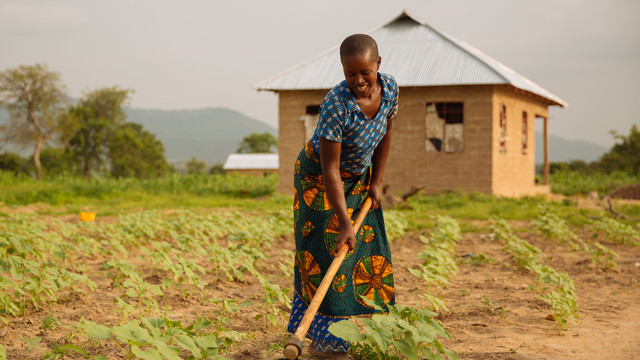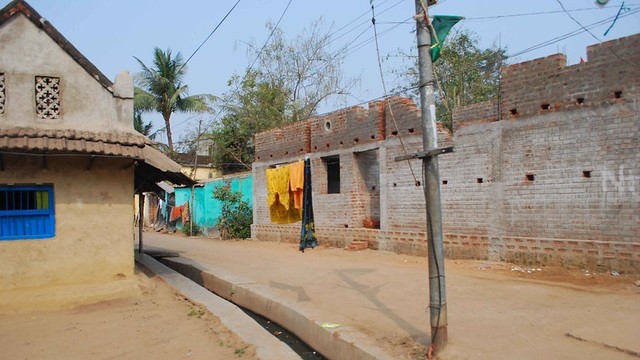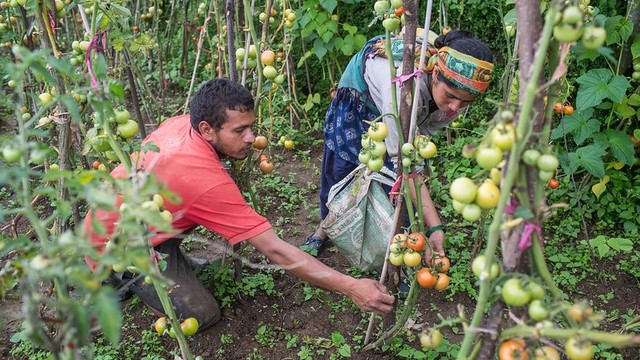Planning land use and access in Tanzania: women have their say
Guest blogger Isabella Nchimbi describes how an innovative project captures the perspectives of women in rural communities to inform land use planning.


Community members during the development of village sketch map and establish village boundaries at Kisangire Village (Photo: copyright TAWLA)
In Tanzania, customary land rights are recognised in the Land Act and Village Land Act. Yet legally recognised rights do not equate to secured rights, and ever-mounting pressures from investments, climate change and population growth are increasingly threatening communities’ access to and control over land.
Women find themselves on the sharp end of, and undermined by, the growing pressures that threaten rural communities’ land rights.
To improve land tenure security for rural communities, promote sustainable land use and reduce conflicts, the government is undertaking village land use planning (VLUP), a lengthy and expensive process which involves demarcating village boundaries and zoning village land for different uses. Examples include identifying residential areas, demarcating land for farming and grazing, and mapping out forests for foraging and harvesting firewood.
Once land uses have been mapped out, a land use plan is prepared, and parcels are officially assigned to community members who can apply for Certificates of Customary Rights of Occupancy (CCROs).
The VLUP is critical for communities: this process determines rights to access, use and control over land and natural resources, and will have a lasting impact on their futures.
Process fails to capture community voices
Government guidelines that support implementation of the VLUP recommend the process is carried out in a participatory way. Villagers are the primary land users; they need to actively inform the process so their needs are taken into account.
Yet in practice, community members are often not actively taking part. And this is especially the case for women.
Under Tanzania’s progressive legal framework, every person has equal rights to own property. Yet gendered social norms undercut women’s rights to land and their involvement in land governance.
For the past eight years, the Tanzania Women Lawyers Association has worked to promote more inclusive land governance, focusing on women’s participation. Our long-standing work with communities across rural Tanzania has shown how gendered norms lead to women being left out of land governance processes, with their interests going unheard, and their rights unrecognised.
Through ongoing engagement with these communities, it became clear to us that these gendered norms were playing out in the VLUP process.
Owning the process
TAWLA piloted an innovative approach in two villages in the Kisarawe district. The aim was to get community members, especially women, taking part in activities that would precede and feed into the government’s official VLUP process so they could play an active role in it.
Our motivation here was ownership of the process: village land is essential to the livelihoods of the community; it is village members who know best the community’s needs and how land should be assigned to ensure their needs are met
In collaboration with the Kisarawe district authorities, TAWLA facilitated three activities:
- Sessions to build awareness and understanding around the needs and benefits of land use planning
- A community visioning exercise – where villagers analysed past and present conditions of their community’s land and natural resources, taking stock of how abundant these resources were in the past compared with today, and developing a plan for a thriving, prosperous future, and
- Participatory community mapping where community members documented their land together. To incorporate ideas of different groups in the community, meetings included sketching out maps of their village that detailed different land uses.
Through taking part in these highly participatory activities, community members understood the practicalities of mapping out land and the importance of zoning it for different use and developing a land use plan. This process highlighted just how fundamental their involvement was: unless they were active and vocal about how land should be planned to meet local needs, community priorities would not be reflected in the outcomes of the land use plan.
Meeting women where they’re at
To raise awareness of the activities, we worked with the village leaders. They stressed the importance of getting women – and as many as possible − to join the activities. In terms of the logistics, we drew on what was established during previous work to support villages to adopt gender sensitive by-laws.
As part of this programme we explored enabling conditions for women to take part in village meetings – for example, holding them at times that would accommodate women’s household responsibilities or duties to care for family members. Meetings and activities were also held in places that were easily accessible for women.

Members of the Village Land Use and Management with the technical person from the district council (second right) at Vilabwa Village during the land mapping and zoning exercise (Photo: copyright TAWLA)
Positive outcomes for women
Women valued playing an active part in all three activities – particularly in the participatory visioning and village sketch mapping exercises.
These activities helped women understand the benefit of planning, how land can be used in a sustainable way, and how to seek formal documentation for their land rights.
These sessions have been especially helpful to us women. They have revealed that we have a role in the regularisation and zoning process. We used to think these things were for men only. Now we understand that for our needs to be accommodated we must participate.
– Sofia Jumbe, a farmer from Vilabwa Village
The activities also helped catalyse a change in men’s attitude, making them realise the importance for women to be actively involved in land governance processes. And, indeed, members of the wider community increased their awareness of women’s land rights and the importance of women’s participation.
Hands-on
TAWLA’s work encouraged women to be members of the Village Land Use Management Committee (VLUM) after being nominated and appointed by the Village Assembly. This body is part of the government’s official VLUP process and assists in mapping and preparing the village land use plan.
Responsibilities of committee members includes walking through all areas of the village on foot with surveyors, mapping village boundaries and existing land uses.
While some women members of the VLUMC reported that this hands-on process was tiring, their input was crucial: through their active involvement on the committee, they could speak up for the needs and priorities of other women.
By way of example, the women committee members were fundamental in ensuring harvesting forests, used mainly by women, to collect firewood, and natural herbs, were properly demarcated and mapped.
We fought hard to ensure the forest from where we can harvest firewood was mapped out. Now they are closer to human settlements. We will no longer need to walk long distances to collect firewood.
Women were heavily involved in the VLUP process, and we’ve done a great job. I was elected to be a member of the [VLUMC] and was appointed committee secretary. Women are now getting top positions – it’s a huge step.
- Bahati Salehe Magendo, a member of the VLUMC in Vilabwa
Keeping the process participatory and inclusive
TAWLA’s engagement with communities in the stages preceding the official VLUP process had a positive impact by ensuring villagers owned the process and their priorities were recognised.
How can progress from TAWLA’s work be taken forward – and built on?
Resource is essential. The government needs to allocate enough financial and human resource to ensure communities are actively engaged at the beginning of the VLUP process, in keeping with the guidelines that recommend the process should be carried out in a participatory way.
An effective VLUP process needs to be supported by people with the right skills. To support implementation, the district authorities assemble the Integrated Planning Land Use Management (IPLUM) team comprising professionals from across different district-level departments. Technical know-how is key – from land and natural resources experts who have experience in land use planning and management, to surveyors who have experience in measuring and mapping the land.
The team also needs members who understand community dynamics, who understand how to create spaces that foster engagement. Each member of the IPLUM team needs to understand the importance of community engagement and, as needed, take training on aspects of the guidelines around community participation.
Since the district authority is responsible for ensuring the VLUP process is carried out in accordance with the guidelines, it is the authority’s role to ensure the appointed members have the right skills for the IPLUM.
These measures will help put community needs at the heart of the VLUP process that is so crucial for their futures.



